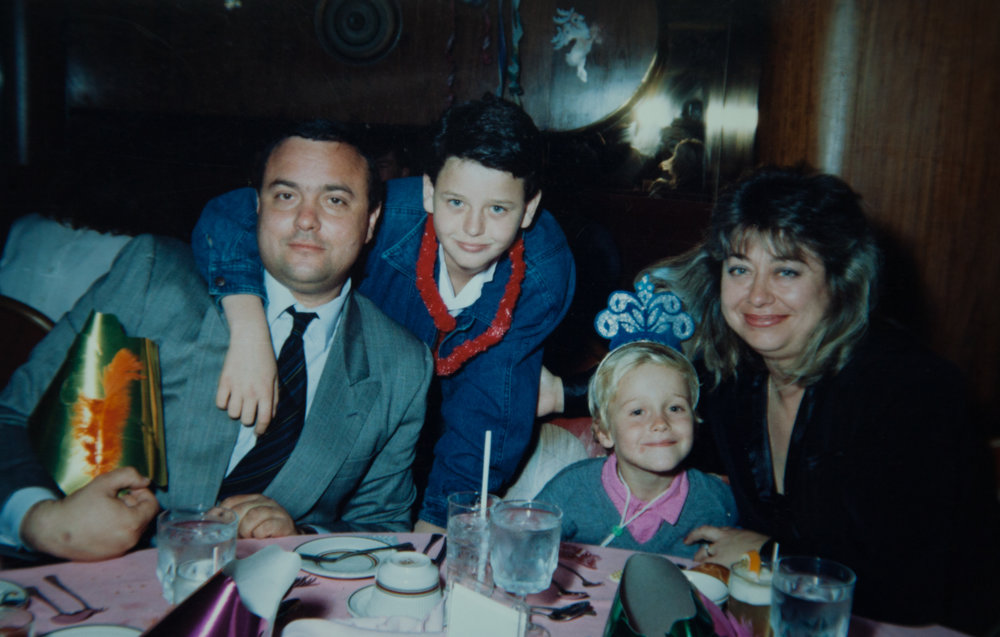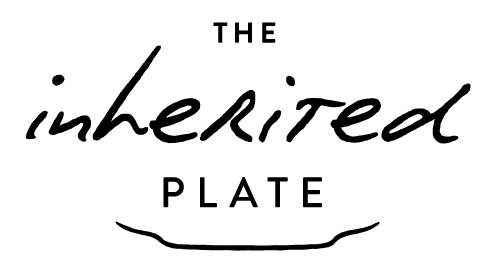Draniki: Chef David Nayfeld's family refugee story that brings light, and a totally new potato pancake this Hannukah

Chef David Nayfeld walked briskly into my NYC studio apt. His arms were adorned with tattoos and his blonde hair, cropped close to his head. He looked a little tired, but completely determined.
The bay area native and Eleven Madison Park Alum was at the time slated to open Chef Fico, the new Italian restaurant on Divisadero, focused on wood fire cooking, pasta fatta a mano, a bar program inspired by amaros, a special section to the menu dedicated to Rome’s Jewish Ghetto, and a pastry menu crafted by James Beard award winner Angela Pinkerton to boot.
A tall order. But that day was not about fine dining, nor rustic Italian recipes.
David came over to cook in my kitchen and share a recipe from his native Minsk, a Belarusian dish called draniki.
The American Jewish Joint distribution committee (“the joint” as they were known by many refugees from the former soviet union, eastern Europe, and the middle east over the past 100 plus years of giving aid and support) invited me to speak about some of the home cooks and chefs I have worked with for my recipe preservation project The Inherited Plate.
They asked me if I’d cooked with any former soviet emigres and immediately David’s family came to mind.
I asked him if he would share a special dish in the kitchen that came from his family and he very quickly knew what he’d like to share.
A marriage between the latke and Russian katleti, draniki is unlike the usual eastern European grated potato pancake. Here, the potato is pushed through a meat grinder with an onion, then mixed with egg, flour, salt and pepper. Fried in hot oil until golden, a small divet is formed in the pancake and a spoonful of ground chicken thigh seasoned with parsley, salt and pepper is added to the center, a little more potato batter spooned over top.
When the draniki is fried on both sides, the fluffy blini-like pancake, fully encloses the chicken.
David spooned thick Russian sour cream and a dollop of my homemade applesauce on the draniki and showered on the chives.
“It’s really a dish for the working class proletariat,” David explains. “Carbohydrates, protein, and some thing you can easily hold in your hands and bring with you to work. If you do the sour cream, it’s not kosher.”
As David makes the draniki, he recalls his incredible family story. The son of Jewish refugees, David’s parents Galina and Mark were, like so many soviet Jews during the 70’s and 80’s, escaping persecution by the govt, marginalization and discrimination. Afraid of being caught, on the evening of Galina’s 30th birthday, they announced their secret departure and took their 3-year old son Misha to the train station and headed into the dark night for the polish border.
There, plain-clothes men carrying machine guns met them. Galina, in a later interview, begins to cry. She recalls that these men were not allowed to speak to the refugees. They were there in fact to protect them and ensure safe passage to Austria and Italy where many refugees were held while their papers were processed to go to Israel or the United States.
He explains part of the story like this:
My mom graduated at the top of her class in music school. The way the state was supposed to be run was that when you graduated at the top, you got the prime placement. Essentlially what my mom was given was the placement of someone who had almsot flunked out of school because she was Jewish.
For her, there was no opportunity…In a world where people are feeling prejudice or in a place where they don’t have opportunity, people of strength will always try to persevere and find a better life. Something I’m thanksful for growing up in Jewish culture and community is that we do have a major sense of community.
Something I’ve learned in my life, is that the jewish comminuty when you are in need, there is this sense of the village and that was the first time my parents experienced that, the idea that the village was there for them.
While they were waiting for their refugee status, the jdc was essentially their only support line. They had no family, they had no friends. They didn’t even know how to fill out paper work in English. The idea that jews were out in the world and willing to protect them was something very powerful because no one was ever willing to protect them.
My father grew up very much on the side of the tracks where if you were walking through an apartment complex, you walk through one apartment complex where they didn’t like jews. Maybe they started throwing bottles at you or saying things. You had two choices at that time. You could stay and you could fight or you could run and keep running. As my father likes to say, he wasn’t very good at running.
That fighting spirit, that perseverance is something David has certainly brought with him and what he has transferred, like his parents into an ambition to succeed and push his team at Che Fico and Theorita, along with with his partners, Matt Brewer and Angela Pinkerton to be the best through practice and hard work.
“When my parents arrived in NY, they had $30.” My parents believed in the American dream. The kind of Jewish woman I encountered was very strong. My mother cleaned houses to get through chiropractic school. There was never a complaint in her eyes. There was cooking, their was cleaning other peoples homes, there was going to school and there was working. There was raising two kids with no excuse. And their was finding success. Working so hard, and you kept working towards success until it was achieved.”
As refugees, they decided to move to Alameda in the bay area and David expressed his gratitude for growing up amongst people of so many diverse backgrounds. “I took for granted my parents experiences. I was born in the bay area as an American, one of the most accepting places. To me, race, gender, sexual orientation were just differences we accepted. All of my friends never looked like me, and we the way we all felt was that race was just an accepted difference. I never experienced discrimination until I went to other parts of the country.”
David brings that spirit of loving all people of all backgrounds to everything and everyone he meets. Hard work, passion, following your dreams where success isn’t even a question are the values his family instilled and the ones he brings to his work every day.
Since Chef Fico and Theorita have opened, it has landed on Bon Appetite Magazine’s top 50 new restaurants. Eater has nominated David and his partner Angela Pinkerton top San Francisco Chef of the Year.



